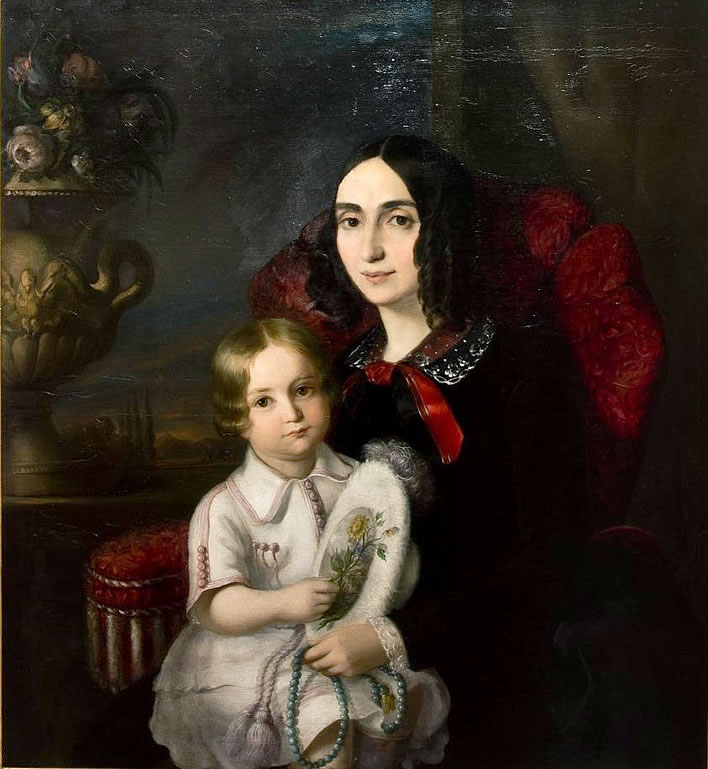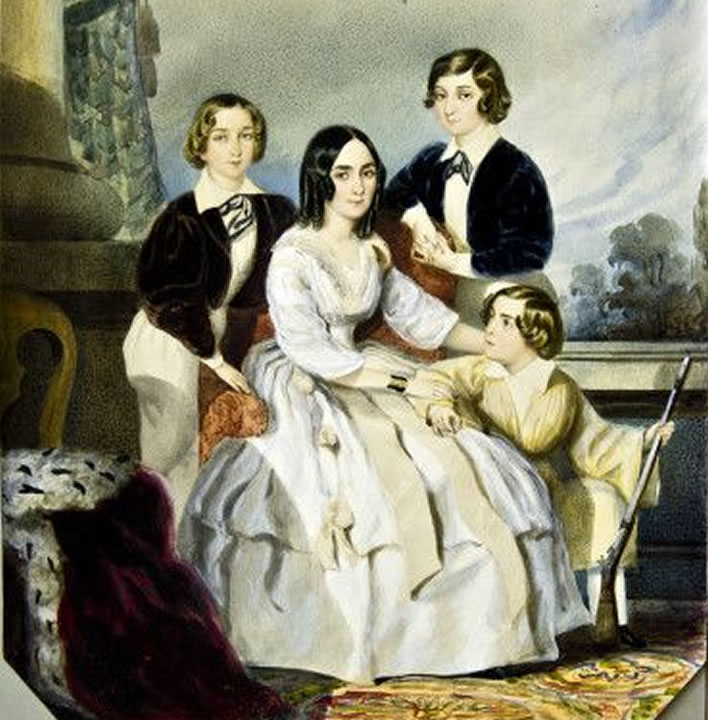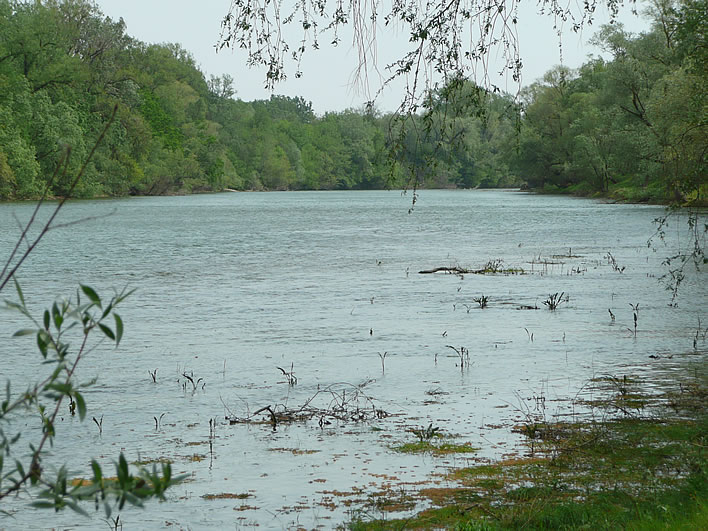The first children
Posted on UTC 2025-02-02 08:00
The lost son
Although my pregnancy was difficult I suffered it very gladly, for my soul longed for a child. In the third month I fell seriously ill, which probably affected my poor child, since without any other cause I gave birth on 11 August 1839 to a five month old dead baby boy. This new stroke of fate was extremely painful, particularly since I had no time to deal with my sorrows, since my husband fell seriously ill. I had to fear for his life. He was five weeks in danger, but the great God helped us and he recovered.
So beschwerlich auch meine Schwangerschaft war, so litt ich doch sehr gerne, denn meine Seele sehnte sich nach einem Kinde. Den 3. Monat erkrankte ich sehr bedeutend, was meinem armen Kinde geschadet haben mag, denn ohne andere Ursache gebar ich den 11. August 1839 ein fünf-monatiges totes Knäblein. Sehr schmerzlich war mir dieser neue Schlag des Schicksals, indessen hatte ich nicht Zeit mich meinem Schmerz hinzugeben, denn mein Mann wurde schwer krank. Ich mußte für sein Leben fürchten, fünf Wochen war er in Gefahr, aber der große Gott half uns und er genas.
Son Alexander
On Sunday, 28 July 1840, at one o'clock in the morning, I gave birth to my dear son Alexander. The delivery was one of the most terrible. My life was in great danger. However, when all was over, the jubilation and the joy knew no end. My husband, who had been almost in despair, surrendered totally to his joy. Everyone took part and everyone was happy! On 21 August 1840 he was baptised! At my request he was given the name of his father – may God ensure that he bears it as worthily as he does. We asked Frau Anicka Gika [Anicuta/Anica Ghica] to be his godmother and she was gracious enough to agree to our request.
Den 28. Juli 1840 Sonntags um 1 Uhr gebar ich meinen lieben Sohn Alexander. Meine Entbindung war eine der fürchterlichsten, mein Leben schwebte in großer Gefahr. Doch als alles vorüber war, war des Jubels und der Freude kein Ende. Mein Mann der während der Entbindung fast verzweifelt wäre gab sich ganz seinem Glücke hin. Alles nahm daran teil und alle waren glücklich! Den 21. August 1840 wurde er getauft! Auf mein Verlangen gab man ihm den Namen seines Vaters, Gott gebe, daß er ihn so würdig trägt als dieser. Wir baten die Frau Anicka Gika [Anicuta/Anica Ghica] seine Taufpatin zu sein und sie war gütig genug unsere Bitte zu erhören.
'Anicka Gika' is Anicuta/Anica Ghica (1810-1872), who is more often referred to under her married name Anicuta Manu. She was fondly termed 'Manului' by Romanians. She was the daughter of Alexandru Ghica and Ecaterina Năsturel Herascu – The Ghicas were one of the greatest families in Romania, with many memebers in many dynastic branches. She married Ioan/Iancu Manu (1803-1874) in 1827, when she was 17, bringing a large dowry with her. Both she and her husband were Romanian nationalists and were culturally very active. There would be much overlap between their circles in Bucharest and Budești (centred on the Castelul Manu, 'The Manu Castle') and the circle around Gheorghe Asachi in Jassy. It was presumably through this circle that Costinescu and Heloise acquired such an illustrious godparent for Alexander.

Constantin Daniel Rosenthal (1820-1851), Anica Manu cu copilul (Anica Manu with daughter), 1848. Image: Muzeul Național de Artă al României.

Constantin Daniel Rosenthal (1820-1851), Anica Manu cu copii (Anica Manu with sons [George, Alexandru and Constantin]), 1846 Image: Muzeul Național de Artă al României.
14th February 1841
I have to write down my joy and unburden my heart! My dear son Alexo, who is now already over six months old, is flourishing admirably. He is the picture of health and is growing very quickly. My husband and I live now for this sweet being. Our life was always very quiet and withdrawn, but now even more than before. We hardly go out unless we must and even then we find it difficult to leave the lovely little angel. His wet nurse is very good and dutiful.
den 14. Februar [1841]
Ich muß meine Freude niederschreiben und mein Herz erleichtern! Mein lieber Sohn Alexo der nun bereits schon über 6 Monate alt ist gedeiht ganz vortrefflich. Er ist das Bild der Gesundheit und entwickelt sich sehr schnell. Mein Mann und ich leben nun für dieses süße Wesen. Unser Leben war immer sehr stille und zurückgezogen, aber jetzt noch mehr denn je. Wir gehen sozusagen nie aus, außer wenn wir durchaus müssen und auch dann entschließen wir uns schwer, den lieben kleinen Engel zu verlassen. Seine Amme ist sehr gut und brav.
Heloise's hints here about the couple's isolated life in Moldavia can be understood better when set alongside the remarks Heloise made to Grillparzer in her last letter to him, dated 5 November 1847, almost nine years to the day after she had left Vienna for life at the eastern margins of the Empire. She gave the letter to Emil Wickerhauser, Grillparzer's friend, who, at Grillparzer's bidding, had paid her a visit whilst on an official trip to Jassy. Among other things she wrote:
Wickerhauser will tell you of my life and conditions; from the image of this land that he will draw for you, you will realise that only a completely secluded life will do for us, since even my husband is in his heart no Moldauer, rather bourgeois, proud and upright; he neither wants nor seeks association with others, which here would cost only time and spirit; and we live therefore exclusively for our children, bothering little about the world outside, an inner life that benefits our family and which makes us all happy.
Wickerhauser wird Ihnen von meinem Leben und Verhältnißen sprechen; aus dem Bilde daß er Ihnen von diesem Lande entwerfen wird, muß es Ihnen einleuchten daß nur ein ganz zurückgezogenes Leben uns taugen kann, denn auch mein Mann ist im Herzen kein Moldauer, sondern bieder, stolz, und wahr; er will und sucht keinen fremden Umgang, der hier blos Zeit und Geist tödtend wäre, und wir leben daher ausschließlich unseren Kindern, uns wenig um die Aussenwelt kümmernd, ein inneres Leben, was unserer Familie frommt, und uns alle beglückt.
I did not have the pleasure of breast-feeding him. The doctor told me that it could cost his and my lives if I were to insist on feeding him myself! So I was duty bound to forego the great joy of being a mother to my child in the full sense. However, I won't think any more about it, rather thank God even more, that he is flourishing so well with his wet nurse.
Ich hatte nicht das Glück ihn stillen zu können. Der Doktor sagte mir es könne sein und mein Leben kosten wenn ich darauf bestünde ihm selbst die Brust zu geben! So mußte ich denn aus Pflicht das so große Glück entbehren, meinem Kinde im ganzen Sinne des Wortes Mutter zu sein. Doch ich will daran nicht mehr denken, sondern vielmehr Gott danken, daß er mit seiner Amme so wohl gedeiht.
20th July 1841
My poor Alexo is falling behind in his bodily development. He is now already almost a year old and no stronger than he was at six months. This may be due to the fact that his wet nurse is weak and elderly, but now it is too late to take another. The matter troubles me greatly, particularly when I see that my beloved child appears to be very scrofulous. I give him, on medical advice, salt baths, after at first giving him Pruth-Bäder with little success. The situation worries me. I shall wean the child as soon as possible. Please God that he is not going to be ill, I am very worried about him.
den 20. Juli [1841]
Mein armer Alexo geht sichtlich in seiner körperlichen Ausbildung zurück. Er ist nun schon bald ein Jahr alt und nicht stärker als ich ihn schon mit 6 Monaten sah. Dies mag daher rühren, daß seine Amme schwach und ältlich ist, nun ist es zu spät eine andere zu nehmen. Die Sache bekümmert mich sehr, umsomehr da ich sehe, daß mein geliebtes Kind sehr skrofulös zu sein scheint. Ich mache ihm auf ärztliches Anraten Salz-Bäder, nachdem ich ihn zuerst ohne günstigen Erfolg kalte Pruth-Bäder nehmen ließ. Der Zustand ängstigte mich. Ich werde baldmöglichst das Kind von der Brust entwöhnen, Gott gebe daß er mir nicht erkranke, ich bin sehr bang für ihn.
'Pruth-Bäder': The river Pruth or Prut flowed north to south, passing Jassy to its east. Presumably the cold waters of the Prut were thought to have medicinal properties. There were at the time several public baths along the course of the river.

The meandering River Prut, the waters of which are just what sickly babies need. Image: ©Matt Wheeler, 2010.
26th August 1841
I am now weaning my Alexo. His wet nurse is very weak and very ill. Now she has a full fever. For that reason I decided urgently to wean him, since the child is also weak and retarded in his development. Oh, if only it has no bad consequences.
den 26. August [1841]
Ich entwöhne jetzt meinen Alexo. Seine Amme ist ganz von Kräften und sehr schlecht geworden. Nun bekam sie noch vollends das Fieber. Daher beeilte ich mich so sehr, da das Kind auch schwach und in seiner Ausbildung zurücke ist, ihn zu entwöhnen. Ach wenn es nur keine üblen Folgen hat.
15th September 1841
My Alexo is very ill. My forebodings did not mislead me. He had a serious attack of diarrhoea, then a fever on top of that. In the end his illness was so complex that I cannot even list all his symptoms. Our fear is endless. I feel so unhappy. I have almost given in to gnawing, dreadful sorrow.
den 15. September [1841]
Mein Alexo ist sehr krank. Meine Ahnungen täuschten mich nicht. Zu allem Ernst bekam er Abe… (?) dann Fieber dazu. Endlich wurde seine Krankheit so kompliziert, daß ich nicht einmal alle seine Übel benennen kann. Unsere Angst ist grenzenlos ich fühle mich ganz unglücklich. Beinahe unterliege ich nagendem entsetzlichem Kummer.
'Abe…': the transcriber's guess is at the moment unresolved. If we remove the concluding 'e' from the guess, a possibility would be Abweichen, an obsolete term for Durchfall, 'diarrhoea'.
29th September 1841
My child gets worse by the day, he is extremely emaciated. The sweet being is suffering terribly. He is no longer recognisable. He is the picture of consumption. When I see him my soul shudders. Oh my God, give me the strength to bear this sorrow. We both have almost succumbed, My husband is almost more distraught than I am. I have to hide my pain in order to raise his spirits a little. My delivery is also coming closer. How will it be when my child is not better by then? Yet God, who has always shown me such mercy, will not abandon me. In him I trust and on him I rely. We are giving our angel ox-stomach baths. I am told that if these do not save him he is lost. It cannot be that I will lose this child, God is too merciful to allow such a disaster to befall me.
den 29. September [1841]
Mein Kind wird jeden Tag schlechter, er hat die Darrsucht (?) in hohem Grade. Das süße Wesen leidet entsetzlich. Er ist gar nicht me[h]r zu erkennen. Das Bild der Abzehrung ist er. Wenn ich ihn sehe schaudert mir die Seele. Ach mein Gott gebe mir die Kraft diesen Jammer zu ertragen. Beinahe unterliegen wir beide. Mein Mann ist beinahe verzweifelter als ich. Ich muß meinen Schmerz verbergen um ihn etwas aufzuheitern. Meine Niederkunft rückt auch heran. Wie wird es sein wenn bis dahin mein Kind nicht besser wird. Doch Gott der sich mir immer so voll Gnade erwies, wird mich nicht verlassen, nur in ihn traue ich und baue ich. Wir machen jetzt unserem Engel Ochsenmagen-Bäder (?) man sagt mir, daß wenn diese ihn nicht retten er verloren ist. Es kann nicht sein, daß ich dieses Kind verliere, Gott ist zu gnädig um solch Unglück über mich ergehen zu lassen.
According to Carl Canstatt's 1843 work Die specielle Pathologie und Therapie: vom klinischen Standpunkte aus bearbeitet, one of the remedies for Atrophia infantum , the 'atrophy of infants', is boiling the stomach of an ox for an hour and then leaving the child for a quarter of an hour in the lukewarm liquid. [Canstatt, Carl. Die specielle Pathologie und Therapie: vom klinischen Standpunkte aus bearbeitet. F. Enke, 1843, 331 pp., p. 26.]
It is one of the sad aspects of Heloise's situation that she has a husband who is not only a socially inept plodder, but who seems to be even more sensitive and depressive than she is. The pair are in trouble when one depressed partner has to cheer up the other depressed partner.
15th October 1841
Alexo, that beloved child, has survived the bath treatments without showing an improvement. I am told however, that if they had not been beneficial, they would have completely weakened him, indeed he would not have been able to survive them. God grant, that it is so. My courage has gone, my strength reduces more each day, I have permanent pains. For the last six weeks I have hardly slept. Oh, if only the danger were completely averted, then I would happily suffer the most wearisome illness.
den 15. Oktober [1841]
Alexo das geliebte Kind hat ohne bedeutende Besserung die Bäder-Kur überstanden. Man sagt mir jedoch, daß wenn sie ihm nicht dennoch nützlich gewesen wären, sie ihn ganz geschwächt haben würden, ja er hätte sie gar nicht überstehen können. Gott gebe, daß es so sei. Mein Mut ist dahin, meine Kräfte nehmen täglich ab, ich habe immerwährende Schmerzen. Schon seit 6 Wochen schlafe ich beinahme [beinahe] keine Nacht. Ach wäre nur schon die Gefahr gänzlich behoben, dann wollte ich ja gerne auch die langwierigste Krankheit ertragen.
30th October 1841
My Alexo is getting better. I believe there is nothing more to fear for him. I cannot thank the ever gracious God enough for this endless kindness. A second time he has given us our son. My husband is full of happiness and joy, for although the child is a picture of suffering, yet one can see that he has been saved. Good God, we thank you.
den 30. Oktober [1841]
Mein Alexo wird besser. Ich glaube es wird nun wohl nichtsmehr für ihn zu fürchten sein. Ich kann nie genug dem allzugütigen Gott für diese unendliche Güte danken. Ein zweites mal schenkt er uns unseren Sohn. Mein Mann ist voll Glück und Freude, denn obgleich das Kind noch ein Bild des Leidens ist, so sieht man doch schon ganz gut, daß er uns gerettet wird. Guter Gott wie danke ich dir.
0 Comments UTC Loaded:
Input rules for comments: No HTML, no images. Comments can be nested to a depth of eight. Surround a long quotation with curly braces: {blockquote}. Well-formed URLs will be rendered as links automatically. Do not click on links unless you are confident that they are safe. You have been warned!